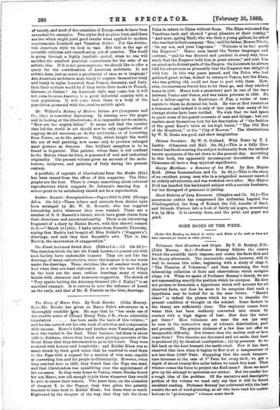The Story of Marco Polo. By Noah Brooks. (John Murray.
6s.)—Mr. Brooks has given us Marco Polo's adventures in a thoroughly readable form. He says that he " has made use of the erudite notes of form.
Henry Yule, C.B., whose admirable translation has been made the basis of this volume;"
and he has carried out his own work of selection and compression with success. Marco's father and brother were Venetian gentle- men who traded in the East. Their business led them in about 1260 to Bokhara, where they beard such glowing accounts of the Great Khan that they determined to go to his Court. They were received with honour and hospitality ; and Kublai Khan was so much struck by their good sense, that he resolved to send them to the Pope with a request for a mission of wise men, capable of converting him and his people to Christianity. However, when they reached Acre in 1269, they found that the Pope was dead, and that Christendom was squabbling over the appointment of his successor. So they went home to Venice, where Nicolas found his son Marco, now old enough to join them whenever they would be able to renew their travels. Two years later, on the accession of Gregory X. to the Papacy, they were given two priestly teachers to take back to Kublai Khan; but these were so much frightened by the dangers of the way, that they left the three
Polos to return to China without them. The Khan welcomed the Venetians back, and showed " great pleasure at their coming." " And next, spying lark; who was then a young gallant, be asked who was that in their company. `Sire,' said his father, Messer Nicol°, ''tie my son, and your liegeman.' Welcome is he too.' quoth the Emperor." Marco soon learnt the Tartar languages and customs, " and he was discreet and prudent in every way, inso- much that the Emperor held him in great esteem," and sent him on missions to distant parts of the Empire. On his return he always told his adventures so pleasantly that the Emperor was delighted with him. In this way years passed, and the Polos, who had gathered great riches, wished to return to Venice, but the Khan, who was getting old, could not bear to part with them. How- ever, circumstances forced him to let them go, and they reached home in 1295. Marco took a prominent part in one of the wars between Venice and Genoa, and was taken prisoner in 1298. He had a fellow-captive in Rusticiano of Pisa, a writer of some repute to whom he dictated his book. He was at first treated as a romancer, and indeed it is only of late years that many of his strange stories have been verified. We wish that we had space to quote some of his quaint accounts of men and things ; but our readers must themselves look for his description of " the fashion of the great Kaan's table at his high feasts," " The Old Man of the Mountain," or the "City of Heaven." The illustrations by W. H. Drake are good, and show imagination.






































 Previous page
Previous page